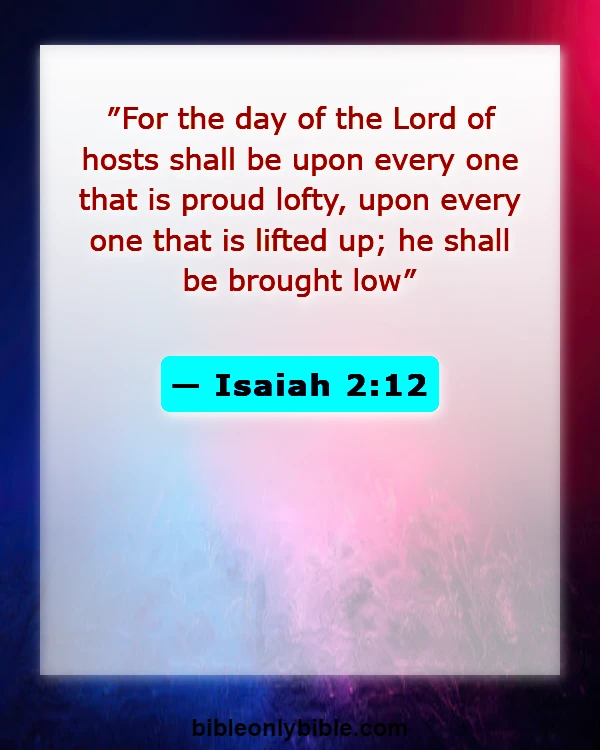Friends, if you’re seeking insight on “Bible Verses About Humility In Leadership,” this content is for you. Today, we’ll explore scriptures that emphasize the importance of humble leadership according to the Bible. These verses will help you better understand how God views humility in those who lead, and how it can positively impact your role as a leader. Let’s delve into what the Word says about practicing humility while guiding others.
Contents
- 1 What Does the Bible Say About Humble Leadership?
- 2 Biblical Examples of Humble Leaders and Their Impact
- 2.1 Exodus 3:11 – Moses questions his worthiness to lead Israel
- 2.2 1 Samuel 18:14 – David’s success through humble wisdom and obedience
- 2.3 Numbers 12:3 – Moses exemplified profound humility as a leader
- 2.4 2 Samuel 7:18 – David’s humble gratitude before God
- 2.5 Daniel 5:22 – Ignoring humility leads to downfall
- 3 How Jesus Demonstrated Humility as the Ultimate Leader
- 3.1 John 13:14 – Jesus models servant leadership by washing feet
- 3.2 Philippians 2:7 – Jesus exemplified humility by becoming a servant
- 3.3 Matthew 20:28 – Jesus served, not to be served, exemplifying humility
- 3.4 Luke 22:27 – Jesus leads by serving, exemplifying true humility
- 3.5 John 13:15 – Jesus exemplified servant leadership through humility
- 3.6 Mark 10:45 – Jesus serves, not to be served, exemplifying humility
- 4 Old Testament Verses on Leadership and Humility
- 4.1 Proverbs 15:33 – Wisdom and humility lead to honor
- 4.2 Micah 6:8 – Act justly, love mercy, walk humbly with God
- 4.3 Isaiah 66:2 – God esteems the humble and contrite in spirit
- 4.4 Proverbs 3:34 – God opposes the proud, gives grace to humble
- 4.5 2 Chronicles 7:14 – Humility and repentance bring divine healing and restoration
- 5 New Testament Teachings on Servant Leadership
- 5.1 Mark 9:35 – Greatest leads by serving others
- 5.2 1 Peter 5:3 – Lead by example, not by domineering authority
- 5.3 Philippians 2:4 – Consider others’ interests above your own
- 5.4 Colossians 3:12 – Clothe yourself with compassion, kindness, humility, gentleness
- 5.5 Romans 12:10 – Lead with love and honor, serving others humbly
- 6 The Benefits of Humble Leadership According to Scripture
- 7 How to Apply Biblical Humility in Modern Leadership Roles
- 7.1 Ephesians 4:2 – Lead with humility, gentleness, patience, and love
- 7.2 Colossians 3:13 – Forgive as the Lord forgave you
- 7.3 Philippians 2:3-4 – Selfless humility values others above self
- 7.4 Galatians 5:13 – Serve others humbly through love and freedom
- 7.5 Romans 12:16 – Live in harmony, be humble, associate with the lowly
- 8 Common Leadership Pride vs Biblical Humility: Key Differences
- 8.1 Proverbs 16:18 – Pride leads to destruction, humility prevents downfall
- 8.2 James 3:13 – Wisdom shown in humility through good conduct
- 8.3 Proverbs 18:12 – Pride precedes downfall; humility leads to honor
- 8.4 Isaiah 2:12 – The Lord opposes the prideful and lofty
- 8.5 Proverbs 29:23 – Pride brings low, humility gains honor
What Does the Bible Say About Humble Leadership?
When we think about leadership, humility might not be the first quality that comes to mind, but it is essential. The Bible teaches us that true leadership is not about wielding power but serving others with a humble heart. Imagine leading not from a place of authority but from genuine care and concern for those you guide. This approach can transform relationships and foster trust and respect in any team.
James 4:10 – Humble yourself, and God will exalt you

Humble yourselves in the sight of the Lord, he shall lift you up
James 4:10
Explanation:- Humility in leadership involves recognizing our limitations and dependence on God, trusting that He will elevate us in due time. This verse encourages leaders to serve with humility, knowing that true exaltation comes from God, not from self-promotion or prideful ambition.
Proverbs 11:2 – Wisdom follows humility, pride leads to disgrace

When pride cometh, then cometh shame: but with the lowly is wisdom
Proverbs 11:2
Explanation:- Pride often results in downfall, while humility paves the way for wisdom and honor. In leadership, embracing humility allows one to learn, grow, and lead effectively, fostering an environment of respect and collaboration rather than arrogance and conflict.
Philippians 2:3 – Value others above yourselves in humility

Let nothing be done through strife or vainglory; but in lowliness of mind let each esteem other better than themselves
Philippians 2:3
Explanation:- In this verse, we are encouraged to adopt a selfless attitude by prioritizing others over ourselves. This mindset is crucial for leaders, as it fosters an environment of respect and collaboration, ultimately reflecting the humility exemplified by Christ.
Matthew 23:12 – Humble yourself to be exalted by God

Whosoever shall exalt himself shall be abased; he that shall humble himself shall be exalted
Matthew 23:12
Explanation:- In this verse, Jesus teaches that true greatness in leadership comes from humility. By humbling oneself, a leader opens the path to being exalted by God. This principle encourages leaders to serve others selflessly, embodying the servant leadership that God honors and uplifts.
1 Peter 5:5 – Submit humbly, God favors the humble

Likewise, ye younger, submit yourselves unto the elder. Yea, all of you be subject one to another, be clothed with humility: for God resisteth the proud, giveth grace to the humble
1 Peter 5:5
Explanation:- This verse highlights the importance of humility in leadership. It encourages leaders to submit to others with a humble heart, recognizing that God shows favor to those who are humble. By embracing humility, leaders can foster a respectful and supportive community.
Biblical Examples of Humble Leaders and Their Impact
The Bible is filled with stories of leaders who embraced humility and left a lasting impact. Moses, for example, was a reluctant leader who depended on God for strength. David, despite being a king, sought God’s guidance and forgiveness. These leaders showed that humility is not about thinking less of oneself, but thinking of oneself less, allowing them to lead effectively and inspire others.
Exodus 3:11 – Moses questions his worthiness to lead Israel
Moses said unto God, Who am I, that I should go unto Pharaoh, that I should bring forth the children of Israel out of Egypt?
Exodus 3:11
Explanation:- Moses expresses doubt about his ability to lead the Israelites, highlighting humility in leadership. This moment demonstrates that true leaders often feel unworthy, yet their acknowledgment of limitations can lead to reliance on divine guidance, ultimately resulting in impactful leadership.
1 Samuel 18:14 – David’s success through humble wisdom and obedience
David behaved himself wisely in all his ways; the Lord was with him
1 Samuel 18:14
Explanation:- David exemplifies humility in leadership by wisely and obediently following God’s guidance. His success and favor with the people stem from this humble approach, demonstrating how true leadership is rooted in wisdom and submission to God’s will, inspiring others through integrity and faithfulness.
Numbers 12:3 – Moses exemplified profound humility as a leader
(Now the man Moses was very meek, above all the men which were upon the face of the earth.)
Numbers 12:3
Explanation:- Moses is described as the most humble person on earth, highlighting his profound humility as a leader. His humility allowed him to lead effectively, relying on God’s guidance rather than his own strength, and fostering trust and unity among the Israelites.
2 Samuel 7:18 – David’s humble gratitude before God
Then went king David in, sat before the Lord , he said, Who am I, O Lord God ? what is my house, that thou hast brought me hitherto?
2 Samuel 7:18
Explanation:- In this verse, David expresses deep humility and gratitude before God, acknowledging his own unworthiness. This moment demonstrates David’s humility as a leader, emphasizing the importance of recognizing God’s sovereignty and grace in leadership, and its positive impact on his reign.
Daniel 5:22 – Ignoring humility leads to downfall
Thou his son, O Belshazzar, hast not humbled thine heart, though thou knewest all this
Daniel 5:22
Explanation:- Ignoring humility can lead to downfall, as demonstrated in the narrative of a leader who overlooks the lessons of humility. This serves as a cautionary tale about the consequences of pride and highlights the importance of learning from past examples of humble leadership.
How Jesus Demonstrated Humility as the Ultimate Leader
Jesus, the ultimate leader, gave us the perfect example of humility. Instead of seeking power or fame, He served others selflessly, washing the feet of His disciples and ultimately sacrificing Himself for humanity. His leadership was marked by compassion and a deep love for people, teaching us that the greatest leaders are those who serve and uplift others.
John 13:14 – Jesus models servant leadership by washing feet
If I then, your Lord Master, have washed your feet; ye also ought to wash one another’s feet
John 13:14
Explanation:- In this verse, Jesus exemplifies humility in leadership by performing the lowly task of washing His disciples’ feet. This act teaches that true leadership is about serving others selflessly, encouraging leaders to prioritize the needs of those they guide and foster a spirit of humility.
Philippians 2:7 – Jesus exemplified humility by becoming a servant
But made himself of no reputation, took upon him the form of a servant, was made in the likeness of men
Philippians 2:7
Explanation:- In this verse, Jesus exemplifies humility by taking on the role of a servant, setting aside divine privilege to serve others selflessly. As the ultimate leader, He demonstrates that true greatness lies in serving and uplifting others, embodying perfect humility and leadership.
Matthew 20:28 – Jesus served, not to be served, exemplifying humility

Even as the Son of man came not to be ministered unto, but to minister, to give his life a ransom for many
Matthew 20:28
Explanation:- This verse highlights how Jesus, as the ultimate leader, embodied humility by serving others rather than seeking to be served. His selflessness sets a profound example for leaders, demonstrating that true leadership is rooted in service and sacrifice for the benefit of others.
Luke 22:27 – Jesus leads by serving, exemplifying true humility

For whether is greater, he that sitteth at meat, or he that serveth? is not he that sitteth at meat? but I am among you as he that serveth
Luke 22:27
Explanation:- In this verse, Jesus illustrates true leadership by serving others, highlighting that greatness comes through humility and service. He exemplifies that a true leader does not seek to be served but to serve, setting a powerful example for all who lead.
John 13:15 – Jesus exemplified servant leadership through humility

For I have given you an example, that ye should do as I have done to you
John 13:15
Explanation:- In this verse, Jesus sets an example of humility in leadership by washing His disciples’ feet, demonstrating that true leadership is rooted in serving others selflessly. This act teaches that greatness comes through humble service, guiding leaders to prioritize others’ needs above their own.
Mark 10:45 – Jesus serves, not to be served, exemplifying humility

For even the Son of man came not to be ministered unto, but to minister, to give his life a ransom for many
Mark 10:45
Explanation:- In this verse, Jesus exemplifies true humility in leadership by prioritizing service over being served. As the ultimate leader, He sacrifices for others, setting a powerful example of selflessness and servant leadership for us to follow.
Old Testament Verses on Leadership and Humility
The Old Testament provides profound insights into the relationship between leadership and humility. Leaders like Solomon and Hezekiah understood that wisdom and success come from recognizing one’s limitations and relying on God’s guidance. These stories remind us that true strength in leadership comes from a humble heart willing to listen and learn from a higher power.
Proverbs 15:33 – Wisdom and humility lead to honor

The fear of the Lord is the instruction of wisdom; before honour is humility
Proverbs 15:33
Explanation:- Wisdom and humility are essential qualities in leadership, as they guide individuals to honor. Embracing these virtues fosters a respectful and effective approach to leading others, aligning actions with a deeper understanding and reverence for divine guidance.
Micah 6:8 – Act justly, love mercy, walk humbly with God

He hath shewed thee, O man, what is good; what doth the Lord require of thee, but to do justly, to love mercy, to walk humbly with thy God?
Micah 6:8
Explanation:- Micah 6:8 calls leaders to embrace justice, mercy, and humility as core principles. It encourages acting with fairness, showing compassion, and walking humbly with God, highlighting that true leadership is rooted in moral integrity and a deep, respectful relationship with the divine.
Isaiah 66:2 – God esteems the humble and contrite in spirit

For all those things hath mine hand made, all those things have been, saith the Lord : but to this man will I look, even to him that is poor of a contrite spirit, trembleth at my word
Isaiah 66:2
Explanation:- This verse highlights that God values those who lead with humility and a contrite spirit. True leadership in the biblical sense is not about power or status, but about recognizing one’s own limitations and relying on God, showing reverence and obedience to His word.
Proverbs 3:34 – God opposes the proud, gives grace to humble

Surely he scorneth the scorners: but he giveth grace unto the lowly
Proverbs 3:34
Explanation:- Proverbs 3:34 highlights the importance of humility in leadership. It teaches that God resists those who are prideful, but extends grace to the humble. Leaders are encouraged to embrace humility to align with divine wisdom and receive God’s favor and guidance.
2 Chronicles 7:14 – Humility and repentance bring divine healing and restoration

If my people, which are called by my name, shall humble themselves, pray, seek my face, turn from their wicked ways; then will I hear from heaven, will forgive their sin, will heal their land
2 Chronicles 7:14
Explanation:- In the context of humility in leadership, this verse highlights the power of humble repentance and seeking divine guidance. When leaders and their communities turn from their wrong ways and earnestly seek a higher purpose, it promises healing and restoration from above.
New Testament Teachings on Servant Leadership
The New Testament emphasizes the concept of servant leadership, where leading means to serve others. Paul, in his letters, often spoke about being a servant to all, highlighting that leadership is not about status but about lifting others. This approach calls us to rethink traditional views of leadership and embrace a life of service, compassion, and humility.
Mark 9:35 – Greatest leads by serving others

He sat down, called the twelve, saith unto them, If any man desire to be first, the same shall be last of all, servant of all
Mark 9:35
Explanation:- In this verse, Jesus teaches that true greatness in leadership comes from being a servant to others. By putting others first and serving with humility, leaders embody the values of compassion and selflessness, demonstrating how leadership is about lifting others up rather than seeking power.

Neither as being lords over God’s heritage, but being examples to the flock
1 Peter 5:3
Explanation:- This verse encourages leaders to guide others through personal example rather than exerting authoritarian control. It aligns with the New Testament’s teachings on servant leadership, highlighting humility and the importance of influencing others through genuine actions and compassionate guidance.
Philippians 2:4 – Consider others’ interests above your own

Look not every man on his own things, but every man also on the things of others
Philippians 2:4
Explanation:- This verse encourages leaders to prioritize the needs and well-being of others, embodying the essence of servant leadership. By focusing on the interests of others, leaders cultivate humility, fostering an environment of mutual respect and collaboration in line with New Testament teachings.
Colossians 3:12 – Clothe yourself with compassion, kindness, humility, gentleness

Put on therefore, as the elect of God, holy beloved, bowels of mercies, kindness, humbleness of mind, meekness, longsuffering
Colossians 3:12
Explanation:- This verse encourages leaders to embody qualities such as compassion, kindness, humility, and gentleness. These attributes are essential for servant leadership, reflecting Christ’s teachings. By adopting these virtues, leaders foster an environment of respect and cooperation, guiding others with empathy and care.
Romans 12:10 – Lead with love and honor, serving others humbly

Be kindly affectioned one to another with brotherly love; in honour preferring one another
Romans 12:10
Explanation:- This verse encourages leaders to foster a culture of love and honor by valuing others above themselves. It highlights the essence of servant leadership, where guiding others is rooted in genuine care, humility, and a commitment to uplifting those they lead.
The Benefits of Humble Leadership According to Scripture
Humble leadership brings numerous benefits, as highlighted in Scripture. It fosters strong communities, builds trust, and creates an environment where everyone feels valued. Leaders who practice humility often find that their teams are more collaborative and resilient. By prioritizing the needs of others, humble leaders cultivate a culture of mutual respect and genuine care, leading to lasting success and fulfillment.
Proverbs 22:4 – Humility leads to riches, honor, and life

By humility the fear of the Lord are riches, honour, life
Proverbs 22:4
Explanation:- This verse highlights the profound rewards that come from leading with humility. By embracing a humble spirit, leaders can gain true wealth, respect, and a fulfilling life. It underscores the idea that genuine success is rooted in humility and selflessness.
James 4:6 – God opposes pride, gives grace to the humble

But he giveth more grace. Wherefore he saith, God resisteth the proud, but giveth grace unto the humble
James 4:6
Explanation:- This verse highlights the divine principle that pride creates opposition with God, while humility attracts His grace. In leadership, embracing humility fosters a supportive environment and invites divine assistance, encouraging growth and harmony within a team or community. Humble leaders are thus empowered with grace.
Matthew 5:5 – The meek inherit the earth
Blessed are the meek: for they shall inherit the earth
Matthew 5:5
Explanation:- This verse highlights the value of humility in leadership. It teaches that those who lead with meekness and gentleness, rather than force or pride, are ultimately rewarded. True leadership involves serving others, and through humility, leaders can achieve lasting influence and fulfillment.
1 Peter 5:6 – Humble yourselves, exaltation comes in due time

Humble yourselves therefore under the mighty hand of God, that he may exalt you in due time
1 Peter 5:6
Explanation:- In leadership, humility invites divine favor and timing. By practicing humility, you’re positioning yourself for eventual elevation and recognition according to divine will. This approach fosters trust and respect among followers, leading to enduring influence and success.
How to Apply Biblical Humility in Modern Leadership Roles
Applying biblical humility in today’s leadership roles means prioritizing empathy, listening actively, and valuing every team member’s contribution. It’s about acknowledging that we don’t have all the answers and being open to learning from others. By fostering an inclusive and supportive environment, leaders can encourage growth and innovation, leading to a more dynamic and successful organization.
Ephesians 4:2 – Lead with humility, gentleness, patience, and love

With all lowliness meekness, with longsuffering, forbearing one another in love
Ephesians 4:2
Explanation:- Embrace humility in leadership by prioritizing gentleness, patience, and love. These qualities foster respect and collaboration, encouraging a positive and nurturing environment. Leading with humility means valuing others’ contributions and perspectives, promoting growth, and cultivating a team spirit rooted in mutual respect and understanding.
Colossians 3:13 – Forgive as the Lord forgave you

Forbearing one another, forgiving one another, if any man have a quarrel against any: even as Christ forgave you, so also do ye
Colossians 3:13
Explanation:- In modern leadership, true humility involves practicing forgiveness and extending grace, just as we are forgiven. This approach fosters a compassionate and understanding environment, allowing leaders to build trust and unity within their teams while reflecting Christ’s love and humility.
Philippians 2:3-4 – Selfless humility values others above self

Let nothing be done through strife or vainglory; but in lowliness of mind let each esteem other better than themselvesLook not every man on his own things, but every man also on the things of others
Philippians 2:3-4
Explanation:- This passage encourages leaders to practice selflessness and prioritize others’ needs, fostering an environment of respect and collaboration. By valuing others above themselves, leaders can inspire trust and unity, reflecting Christ-like humility in their decision-making and interactions.
Galatians 5:13 – Serve others humbly through love and freedom

For, brethren, ye have been called unto liberty; only use not liberty for an occasion to the flesh, but by love serve one another
Galatians 5:13
Explanation:- This verse encourages leaders to use their freedom to serve others with love and humility. In modern leadership, it highlights the importance of prioritizing the needs of others, fostering a culture of service, and leading with a genuine, selfless spirit.
Romans 12:16 – Live in harmony, be humble, associate with the lowly

Be of the same mind one toward another. Mind not high things, but condescend to men of low estate. Be not wise in your own conceits
Romans 12:16
Explanation:- This verse encourages leaders to cultivate harmony, practice humility, and connect with all people, regardless of status. By embracing these principles, modern leaders can foster inclusive environments, promote mutual respect, and lead with empathy, reflecting the values of biblical humility in their roles.
Common Leadership Pride vs Biblical Humility: Key Differences
The contrast between leadership pride and biblical humility is striking. While pride focuses on personal achievement and recognition, humility emphasizes service and the well-being of others. Pride can lead to isolation and conflict, whereas humility fosters connection and harmony. By choosing humility, leaders can build stronger teams and achieve greater, more meaningful success.
Proverbs 16:18 – Pride leads to destruction, humility prevents downfall

Pride goeth before destruction, an haughty spirit before a fall
Proverbs 16:18
Explanation:- Pride can lead to a leader’s downfall, while humility fosters wisdom and resilience. Embracing humility helps leaders connect with others, make better decisions, and avoid the pitfalls of arrogance, ensuring a stable and effective leadership that aligns with biblical principles.
James 3:13 – Wisdom shown in humility through good conduct
Who is a wise man endued with knowledge among you? let him shew out of a good conversation his works with meekness of wisdom
James 3:13
Explanation:- This verse highlights the essential role of humility in leadership by contrasting worldly pride with biblical wisdom. True wisdom is demonstrated through humble actions and good conduct, emphasizing that leaders should prioritize serving others with grace and integrity rather than seeking personal glory.
Proverbs 18:12 – Pride precedes downfall; humility leads to honor

Before destruction the heart of man is haughty, before honour is humility
Proverbs 18:12
Explanation:- This verse highlights the contrast between pride and humility in leadership. Pride often leads to failure, as it blinds individuals to their flaws and alienates others. In contrast, humility fosters respect and collaboration, ultimately leading to honor and lasting success.
Isaiah 2:12 – The Lord opposes the prideful and lofty

For the day of the Lord of hosts shall be upon every one that is proud lofty, upon every one that is lifted up; he shall be brought low
Isaiah 2:12
Explanation:- This verse highlights how God stands against arrogance in leadership. True biblical humility involves recognizing one’s dependence on God, contrasting starkly with the self-reliance and pride often seen in worldly leadership. Embracing humility aligns leaders with divine principles.
Proverbs 29:23 – Pride brings low, humility gains honor

A man’s pride shall bring him low: but honour shall uphold the humble in spirit
Proverbs 29:23
Explanation:- Pride in leadership can lead to downfall, while humility opens the path to honor and respect. Embracing humility fosters genuine connections and trust, distinguishing biblical leadership from worldly pride, ensuring a leader’s success and integrity in serving others.
